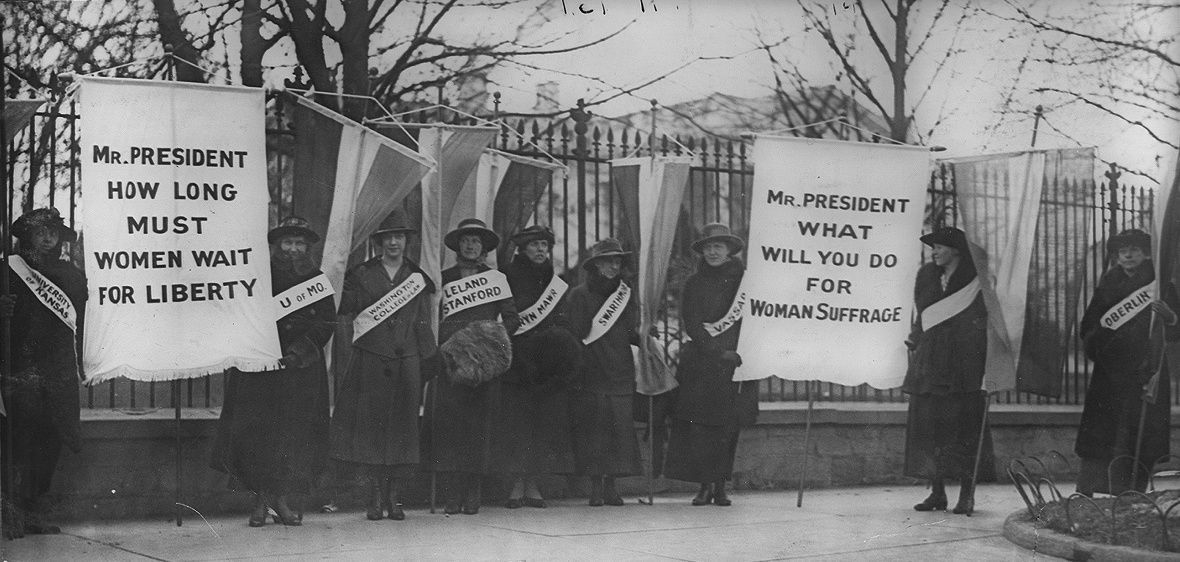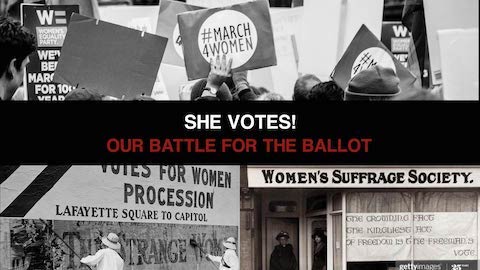
Suffragists picketing in front of the White House, 1917 (Library of Congress)
This article by Errin Haines originally appeared at The 19th.
One hundred years ago, the 19th Amendment to the Constitution declared that the right to vote for citizens of the United States “shall not be denied or abridged … on account of sex.”
But victory in the suffrage movement came at the particular expense of the Black women who fought alongside White suffragists. They would have to fight twice as hard for their right to vote, which they won just 55 years ago with the passage of the Voting Rights Act of 1965.
In the century since White women won access to the ballot, they have often sided with White men, choosing their race over their gender to maintain an unequal America, says Carol Anderson, Emory University professor and author of “One Person, No Vote.”
“Black women’s political power has been about strengthening the United States,” Anderson said. “For White women, it has been about entrenching White supremacy. It is about the ‘we’ versus the ‘me.’ And it’s that difference in framing that is fundamental.”
The fight for women’s suffrage in America grew out of the abolitionist movement, but splintered and became louder after the passage of the 15th Amendment in 1870, which granted the right to vote to Black men. Many White women thought they should have been next in line behind White male landowners for the franchise and began organizing a suffrage movement of their own.
Black women were excluded from and marginalized by White women’s groups. Ultimately, Black women built their own political infrastructure, with groups like the National Association of Colored Women, which endorsed suffrage in 1912.
“The open secret about getting a 19th Amendment out of Congress and out to the states for ratification is that nothing in the amendment interferes with the ongoing efforts to disenfranchise Black voters,” said Johns Hopkins historian Martha S. Jones. “There is a bargain, and the bargain is the sacrifice of Black women’s votes.”
The ratification of the 19th Amendment also ignored Native women, who would not be recognized as citizens until four years later — as well as other minorities, including Latinas and Asian Americans, who were excluded through literacy tests and poll taxes.
Black women would be left in the wilderness for nearly half a century, as White women claimed victory and largely abandoned the fight. Black women like Mary Church Terrell, Mary McLeod Bethune, Anna Julia Cooper, Frances E.W. Harper, Ida B. Wells and others — among this country’s founding mothers — continued to push for equality at the ballot box and society at large.
The civil rights movement of the 1960s brought new soldiers to the fight, including Fannie Lou Hamer, Ella Baker and Septima Clark. But the Voting Rights Act would take years to enforce, and new battles have been waged in every generation since.
Black women are largely the face of the fight for voting rights today because they’ve never stopped fighting, Jones said.
“I don’t think we’ve ever been out of the game,” she said, “If White women have been, that has been their privilege.”
The centennial is an opportunity for White women to return to the struggle en masse, said LaTosha Brown, co-founder of Black Voters Matter, who asked: “Are White women going to recommit themselves around expanding the right to vote, as we stood with them 100 years ago?”
“When there’s a threat to the right to vote for one woman, it’s a threat to all of us,” she said. “White women’s fates are tied to our fate, whether they want to acknowledge it or not. When we challenge racism, we challenge White male patriarchy.”
Today, women are the majority of the electorate. Black women, while not monolithic, use their strength in numbers to show up as a strategic and influential voting bloc — with turnout rates of upwards of 60 percent that go overwhelmingly to Democratic candidates. White women are rarely as united in such large numbers.
Supermajority co-founder Cecile Richards said the organization was founded in 2019 to build an intersectional community committed to building power together, and that “there’s never been a better moment to try and do this.”
“As a White woman, I believe this is a time to make sure we know our history, but also to understand what true political power could look like if we stood shoulder to shoulder with women of color and took the lead of the Black women in this country who have been at the forefront of every battle for social justice — including the one happening right now in this country,” Richards said. “This is a moment for White women in America to finally begin to carry their weight in building the kind of country we need.”
Virginia Kase took over as the head of the League of Women Voters as the 100-year-old organization confronted its complicity in perpetuating a racialized system that excluded non-White women. Kase — an activist who worked on Latino immigrant rights — pointed out that the League was overwhelmingly White and older prior to 2016, but in the past four years has grown to a membership of about 40 percent of women who are younger and minorities.
“The League does not have the right to exist as a whole if it is not reflective of the nation,” said Kase, who is half White and half Latina, but looks like a White woman. “If the only way we’re showing up is as White women, that’s not America.”
Kase said the organization is offering ongoing training across their nearly 800 local chapters to help people understand “how they can show up differently,” including implicit bias, anti-racist and allyship workshops. And the League is currently involved in more than 50 voting rights lawsuits.
Jennifer Butler, a pastor based in Washington who said she is reckoning with her own privilege, is using the centennial to launch the coalition Women of Faith 2020. She said White women have been “co-opted” by voting with White men for decades.
“We have missed an opportunity over the last 100 years to forge an alliance with all women to eradicate misogyny and end the white supremacy that we created from the get-go of this nation,” she said. “We have to reverse all that. Until we do, all women will suffer.”




